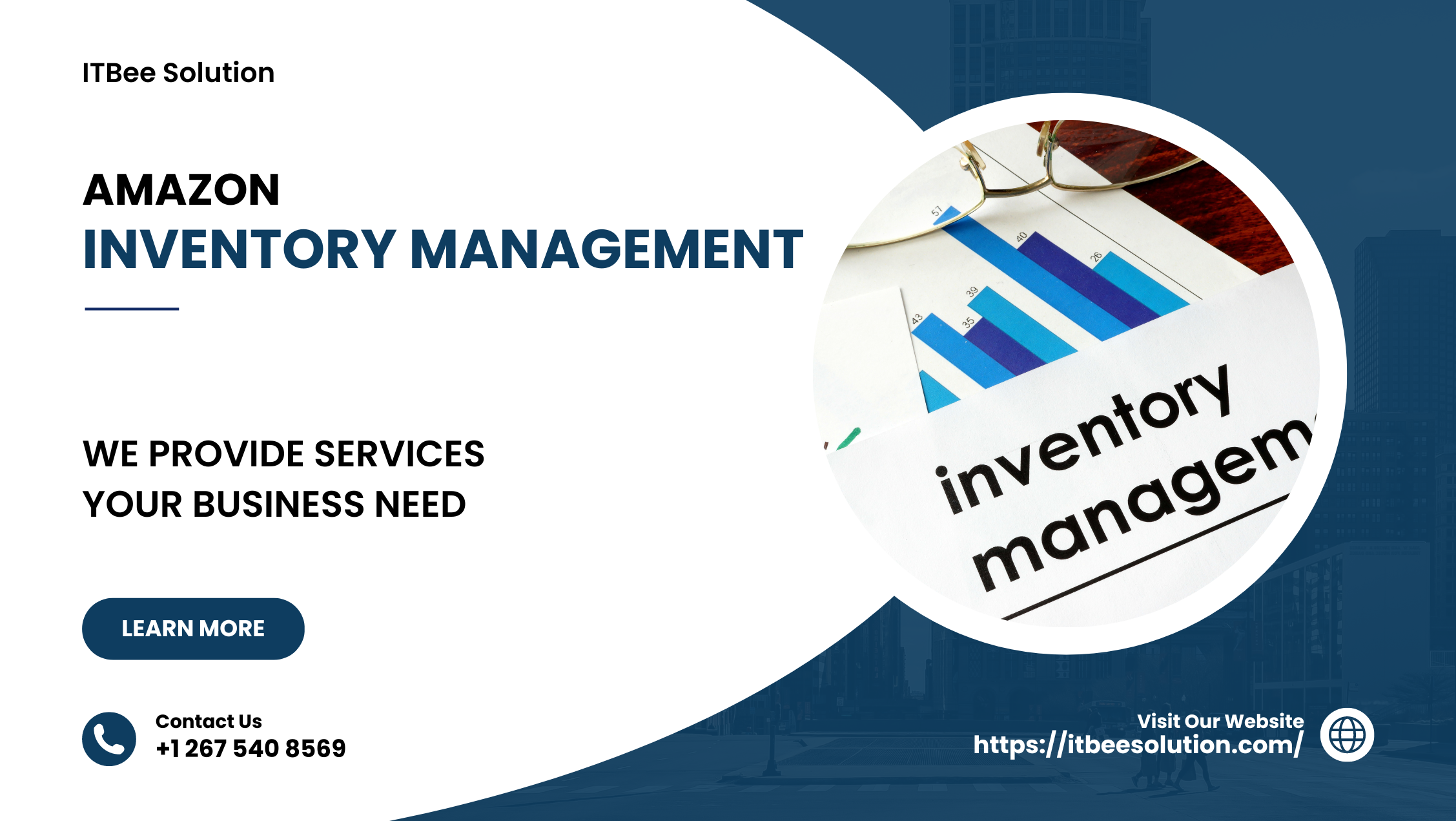- September 4, 2023
- admin
- 0

What Kind of Support Can an Account Manager Provide for Amazon Inventory Management?
Inventory management is one of the most crucial duties for any organization. Depending on how you manage your item stock, it can either help or hurt your firm. Many online retailers must grasp Amazon’s inventory management to keep their online stores running well.
However, it’s not a simple task. Let’s find out the benefits of having an experienced account manager handle inventory for your Amazon business and how they can make sure it is managed effectively.
Learning about Inventory Management
You must be ready to satisfy your clients’ rising expectations as your company expands and your target market expands. Inventory management steps in at this point to save the day for your business.
In order to track, organize, and efficiently manage the total amount of products that sellers have in stock, inventory management requires carrying out a variety of procedures and responsibilities. Business owners may easily satisfy client requests while preventing any of their products from spoiling with effective inventory control.
Sellers control their inventory to get a variety of advantages and prevent calamities related to storage. For example, consistently carrying out these duties can
- Provide a complete and accurate picture of the product inventory to business owners.
- Allowing vendors to efficiently complete existing and new orders
- Avoid overstocking and stockout difficulties
- Prevent product deterioration or damage.
- Keep inventory and storage costs in check.
- indirectly improve customer service and other crucial business functions
What is the inventory management system used by Amazon?
The Cost of Goods Sold (CoGS) and shipment tracking time metrics are inputted and shown in real-time for sellers by the automated machine learning model that powers the Amazon inventory management system.
If they decide to sell through the Amazon Fulfillment Network and utilize one of its fulfillment options, Fulfillment by Amazon (FBA), interested merchants will have access to such inventory management solutions. The massive inventory of the e-commerce behemoth is managed by the Amazon Fulfillment Network, which also takes care of all fulfillment tasks.
Let’s talk about the main components of Amazon’s complex architecture before delving deeper into it to understand its stock management system.
FBA Inventory Management in the Fulfillment Network
To serve the millions of FBA sellers on the platform, Amazon has set up roughly 200 fulfillment facilities throughout the world (110 in the US alone). Each fulfillment center has a daily capacity of millions of items, and each warehouse is roughly 800,000 square feet in size.
It’s difficult to hold a lot of stuff, to put it mildly. Fortunately, Amazon has a well-organized barcode and labeling system to reliably and precisely trace each goods in their warehouses. For effective monitoring and identification throughout the fulfillment process, each item has a distinct barcode.
In order to put products in these fulfillment centers optimally, Amazon also employs complex inventory placement algorithms and cutting-edge routing technologies.
Once an order is placed, these technologies automatically determine which FBA warehouse is nearest to the client and has the item in stock, reducing delivery time and improving the fulfillment process.
Due to the unique barcodes that each item has, merchants can easily keep track of their inventory levels and monitor the availability of their products in real-time, allowing them to better manage inventory and prevent item shortages and underutilized inventory.
Over at Seller and Vendor Central
As previously indicated, sellers will get access to Amazon’s sophisticated inventory control system by adopting FBA. Additionally, Amazon business owners will get access to a variety of tools on the Seller and Vendor Central dashboards.
With the use of these technologies, merchants will be better able to manage their inventory, set replenishment alerts, track sales progress, and keep an eye on inventory levels. These tools include, among others:
- To help with decision-making, routine inventory reports on sales and order history are provided.
- Bulk listing and editing to instantly update inventory
- Automatic pricing and repricing functionality based on market competition at the time
- method for managing excess inventory to boost profits
- Tools for tracking FBA procedures
In order to help merchants manage inventory across numerous sales channels, including other Amazon-owned ecommerce platforms, Amazon also provides multi-channel inventory management tools and integrations.
Score on the Inventory Performance Index (IPI)
In addition to the tools listed above for Seller and Vendor Central, Amazon also offers the Inventory Performance Index, or IPI score, as a metric to aid in stock management.
The IPI score, which ranges from 0 to 1000, provides merchants with feedback on how effectively they manage their inventory. The indicator is determined by how effectively they manage three types of inventory: surplus inventory, in-stock inventory, and stranded inventory, or things without active product listings.
Amazon rewards brands with excellent and high IPI scores (between 500 and 800) by reducing FBA inventory costs and expanding the storage space available to such sellers in order to encourage business owners.
Of course, when there are rewards, there will also be penalties. It’s advisable to always keep a careful check on your IPI score because scores below 400 may potentially restrict a seller’s storage in FBA facilities.
5 Ways an Account Manager Can Ensure Effective Amazon Inventory Management
You’ll need all the assistance you can get, and an account manager can provide it due to how tedious and difficult inventory management can be.
An Amazon account manager will take care of all chores and procedures related to using an Amazon seller account, as suggested by the name, including account setup, brand registration, product releases, and listing optimisation, to mention a few.
For instance, all of the aforementioned procedures as well as inventory management are included with Seller Interactive’s full account management services. The following actions are carried out by experts to guarantee the best inventory management.
Restocking and Storage Threshold Optimisation
Account managers may determine the best restocking thresholds by examining sales data, seasonal patterns, and market trends. By doing this, they can ensure that replenishment orders are sent at the proper time and avoid problems like stock outs or excess inventory.
Additionally, an account manager evaluates Amazon’s storage costs, fulfillment possibilities, and storage restrictions to develop the most cost-effective plans that complement the seller’s spending plan and expansion goals.
Common Storage Problems: Solutions
Clients can get assistance from an account manager with frequent FBA storage problems like misplaced items, incorrect labeling, and storage restrictions. Account managers do routine inventory audits to find and correct inconsistencies and make sure that all items are accounted for in Amazon’s system.
When products are properly labeled, fulfillment times can be reduced while still meeting Amazon’s criteria. Account managers prevent excessive storage fees and maximize product availability by maintaining storage limitations and dividing inventory among FBA centers.
Getting Restricted Categories Unlocked
There are limitations on merchants’ access to certain product categories on Amazon. An account manager can assist sellers in navigating the complexities of Amazon’s product category approval procedure.
Account managers compile the required paperwork, produce attractive product listings, and file appeals for any denials to remove these constraints, enabling clients to diversify their product offerings and increase their platform potential.
Managing Listings & Repairing Delisted Products
Unmanaged product listings might result in problems like delisting and stockpiling, which can cost you sales. On the other hand, you may make sure your product listings are properly optimized and receive the search visibility they merit by hiring an account manager to keep an eye on your listings on a frequent basis.
Account managers find the underlying reason why products are delisted and take the appropriate corrective steps, such upgrading photos, changing descriptions, or attending to consumer complaints.
Maximizing Support from Amazon
Finally, an account manager communicates with Amazon’s Seller Support on a regular basis to fix problems, settle disputes, and request assistance with more complicated difficulties. By learning about platform updates, policy modifications, and best practices, the account manager can ensure that inventory operations run more efficiently.
Read: Why Hiring an Amazon Account Manager Is Still Beneficial
Additional Advice for Successful Inventory Management
Here are some more recommendations to help you prevent bad inventory management and make sure your Amazon inventory is preserved and managed properly.
Maintain Regular Contact With Your Supplier
Keep in touch with your product suppliers frequently and keep a positive relationship with them. You can let your suppliers know about your inventory requirements and market expectations by staying in touch with them. By keeping in touch, your supplier can make the necessary adjustments to their production and delivery schedules.
Keep An Eye On Your IPI Score
Monitoring this indicator consistently will make it simple for you to see any problems with your stock management. The other crucial inventory management activities, such as prompt restocking, eliminating excess products, and updating broken product listings, will come after you have checked your IPI score.
Utilize the best inventory management tool.
Your inventory management procedures can be made even more efficient and streamlined by using Amazon inventory management software.
A centralized inventory management system can provide real-time information on supplies and trends while ensuring appropriate storage levels. To speed up your inventory procedures, it is best to use technologies that automate inventory management components.
Manage Your Inventory With the Experts from Amazon
Every prosperous firm and every successful organization are the result of effective inventory management. You can easily manage your product storage if you have the necessary assistance and access to Amazon’s inventory management tools.
To achieve effective inventory management, take into consideration collaborating with Seller Interactive’s Amazon specialists!
Contact us now at ITBee Solution to schedule a consultation so that our experts can assist you in growing your Amazon business.

